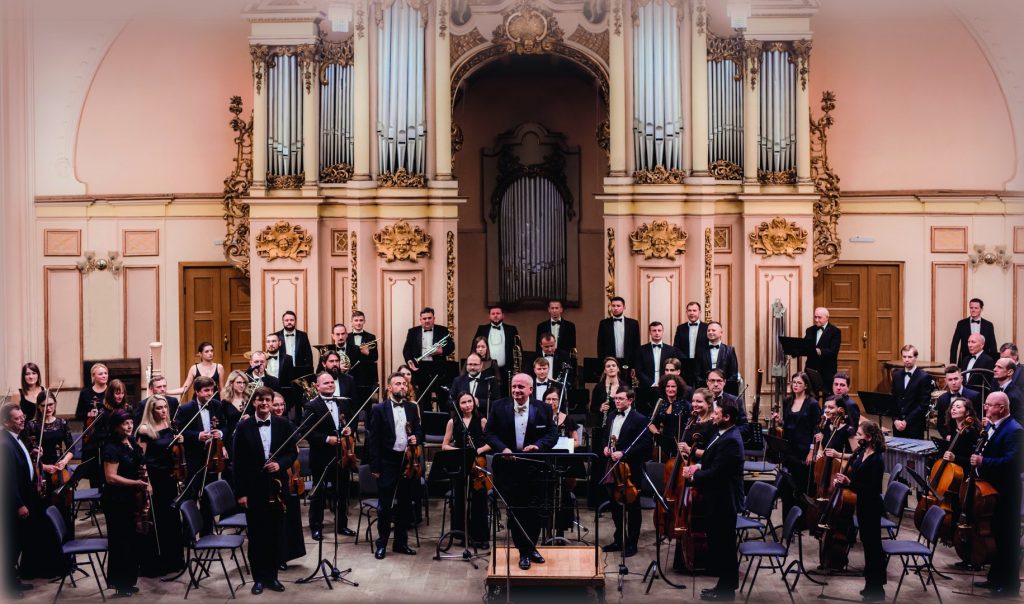Photo: The National Philharmonic of Ukraine | By Joe Mulhall, The Guardian | Whether as simple consolation, celebration or to gird nerves for battle, musicians in Kyiv have found an important role in the war. Six of them tell us how they fight
At first glance, Kyiv looks and feels relatively normal. One year on from the full-scale Russian invasion of Ukraine, the streets, bars and restaurants once again bustle with people going about their lives. Look a little closer however, and it becomes clear how completely transformative and tragic the war has been. Bombed-out Russian tanks, missile ravaged skyscrapers, checkpoints, sandbags and tank-traps all scar the city. Life plays out to the daily wailing drone of the air raid sirens, bouncing off buildings. Worse is the constant fear for loved ones fighting further east on the frontline. People dread their phones pinging with more bad news.
It is hard to imagine living in such circumstances but for many, solace has been found in music. Despite the war – in fact, because of it – Ukraine’s cultural scene is fizzing with artists who have turned to music for comfort and resolve in the darkest of moments. They are using music to steel their souls, assert their identity and inspire opposition to the invasion. At a time of unimaginable fear and suffering, the musicians of Ukraine have decided that playing and listening to music is an act of resistance. Six of them – from orchestras to punk bands and radio broadcasters – tell their stories.
‘This is our cultural front. We are fighting here’
When the war started in February 2022, Lysenko Column Hall, the palatial home of the National Philharmonic of Ukraine, was turned into a barracks. “We had an explosion under this bridge,” says head of marketing Taras Ostapenko, pointing just beyond the building. “One rocket came and parts of the windows from the offices were broken.” As the imminent threat of Kyiv falling subsided, the orchestra resumed its concerts, first streaming online, then in person. Tickets are limited to 160 people – the capacity of their bomb shelter.
Despite some of the orchestra’s staff joining the army, musicians escaping to Europe and endless air raid sirens disrupting rehearsals and performances, the orchestra has managed to stage concerts with impressive consistency. “I think people are looking for an exit from this,” Ostapenko says when asked why they continue to perform in such difficult circumstances. “And they find somewhere to go to forget about war. Many of them feel they need it for medicine, to cure their spirit.”
“There are different forms of defiance and resistance,” adds orchestra manager Larysa Parkhomyuk. “For us, for Philharmonic people, it is a way to go on with life … This is our cultural front. We are fighting here.”
‘We want to make a new image of Ukrainian culture based on our history and our heritage’
Hidden away in a building near the Dnipro River, you hear Gasoline Radio before you see it. A thumping drum beat thrums through its walls and fills the shabby courtyard out front. Launched by Oleksii Makarenko just two days before the invasion, the station has a clear mission. “We want to make a new image of Ukrainian culture, but it should be based on our history and our heritage,” he says. The station platforms an eclectic mix of genres ranging from traditional Ukrainian folk and classical to electronic, ambient, avant-garde and experimental music.
> > > > > > > > >
Read the whole story here:
https://www.theguardian.com/music/2023/mar/08/for-now-music-is-a-weapon-the-ukrainian-musicians-playing-on-as-an-act-of-resistance
Joe Mulhall is director of research at the anti-fascism organisation Hope Not Hate. He is the author of numerous books on postwar fascism and will publish Rebel Sounds: Music as Resistance in 2024
[Thanks to Alex Teitz for contributing this article! http://www.femmusic.com]

Home
Reports‘For now, music is a weapon’: the Ukrainian Musicians Playing On As An Act of Resistance
